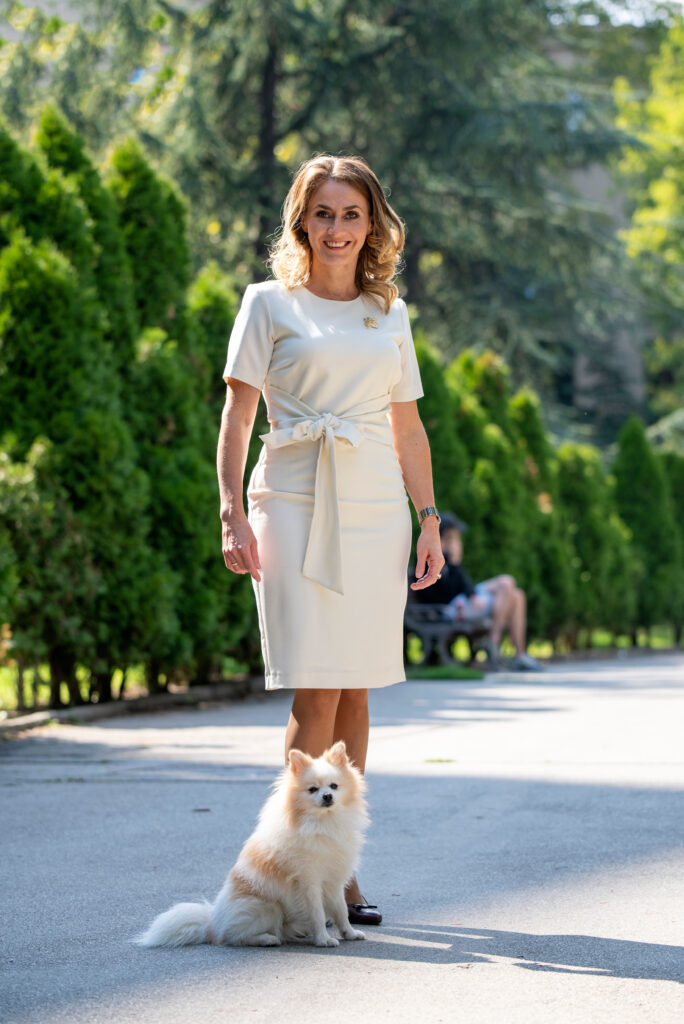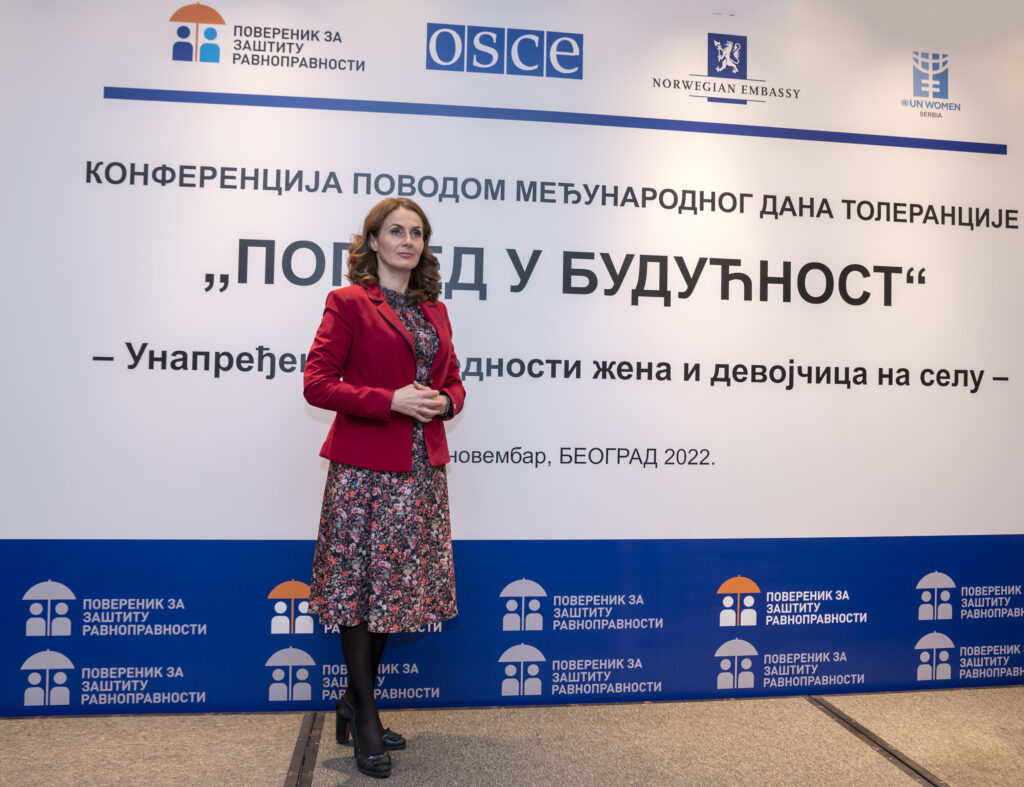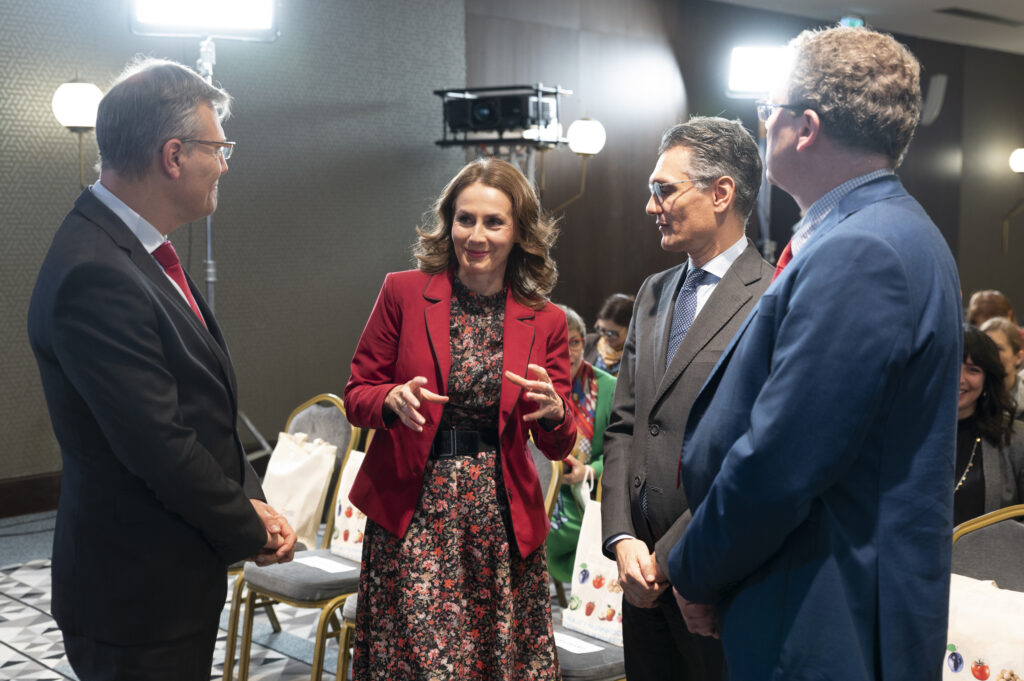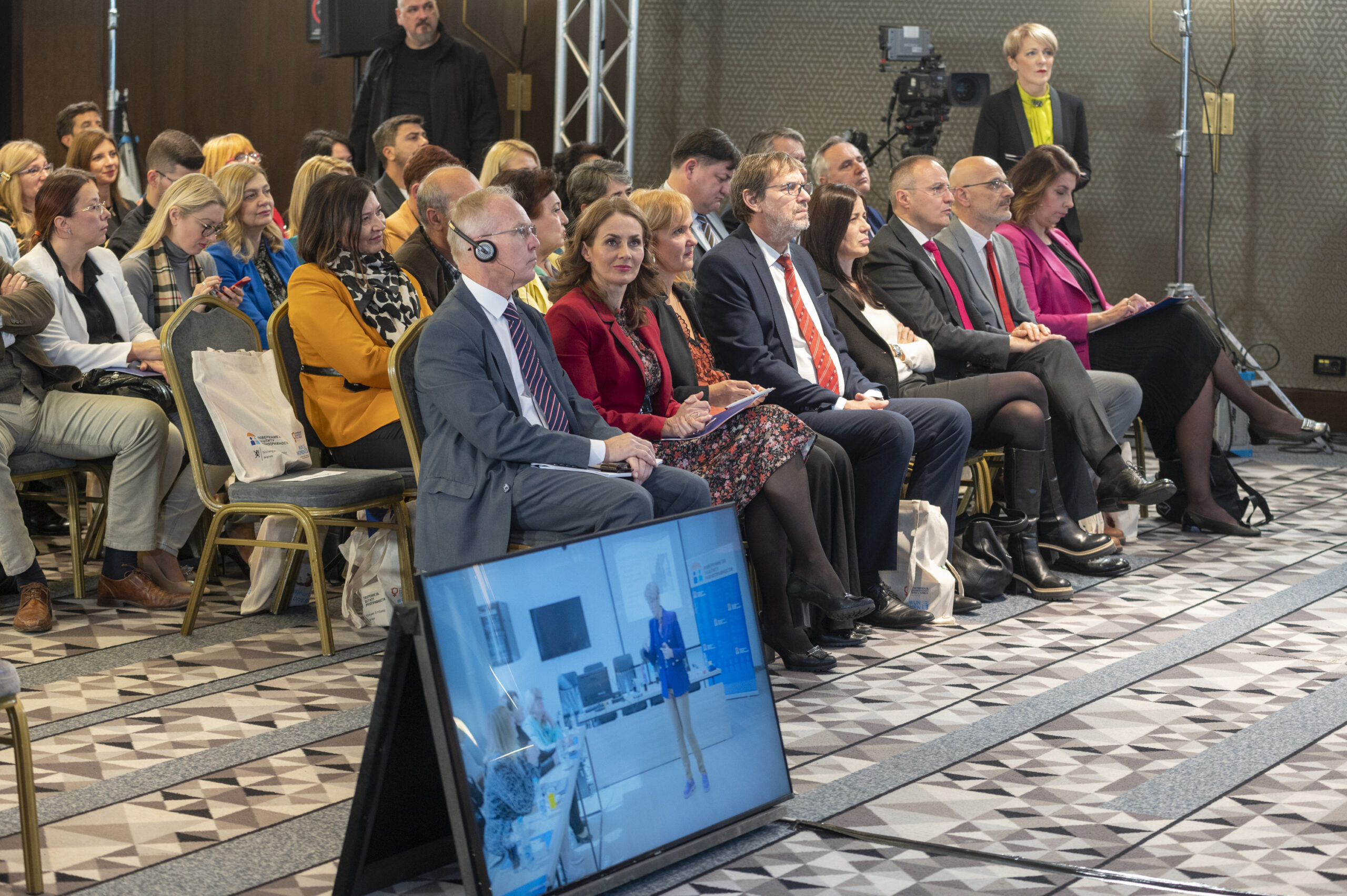What is particularly worrying is that violence is becoming a part of everyday life

As someone who, unfortunately, has a lot of work to do, the Commissioner for the Protection of Equality, Brankica Janković, always has time to discuss current topics that are a great challenge both for her professionally and for our society as a whole.
The recent earthquake in Turkiye and Syria claimed over 50,000 lives. And while on the one hand, it has revealed a high degree of humanity and solidarity, on the other hand, it unveiled a rather terrifying fact. Syria was left without almost any help from the West. How do you comment on this situation that could be called „the downfall of civilization? As a global society, we have found ourselves in a situation where some victims are less important than others.
‘The downfall of civilization’ – that’s a good definition. Still, we have a chance for salvation – it is not dark and it is not nighttime – but we have good enough reason to be deeply concerned. Not being treated the same in a natural disaster that was not your fault, not being equal and not having the same rights require us to ask ourselves what is wrong. We, Europeans, should be the first to ask ourselves this, as we are the authors of many human rights conventions in different segments. We are the ones who have met or are still working to meet international standards in this regard. I do not want to say that the UN as a global organization does not have the same responsibility, but I am speaking from the position of a European institution for the protection of equality. One’s life cannot be more or less valuable, just as human rights have no gender, nation or religion, but apply to everyone. Nevertheless, throughout history, we have had different views on victims and tragedies, which were influenced by many factors and circumstances. Unfortunately, poverty is one of them and yes, it significantly determines the attitude towards a problem. The relationship between democracy and non-democracy and poverty is closely related and influenced by numerous variables. Where there is no democracy, some other things dictate attitudes and approaches.
After the earthquakes in Syria and Turkiye, the scale and manner of sending and providing aid in these two countries is a glaring example of the existing social and social inequality
After the earthquakes in Syria and Turkiye, the scale and manner of sending and providing aid in these two countries is a glaring example of the existing social and social inequality. Syria has received some aid, but it was not the way it should be in situations such as an earthquake or floods that leave tens and thousands of people homeless – it should have been faster, more efficient and more extensive. It is immoral to differentiate between people just because of their nationality or the regime that is in power in their country, that is, because of the prevailing political attitude about that country. In the end, times change, as do policies and attitudes, and solidarity between peoples in trouble is long remembered and is often an opportunity, a sad one indeed, but still an opportunity to improve relations between countries.
In this situation, Serbia was far more responsible and humane than many countries and societies that are preaching their moral lessons to us. How much should we be concerned about this polarization in the world today and where we stand in that division?
Helping others in an unfortunate situation is part of our cultural identity. I am glad that we, as a country and society, have been perceived that way this time as well. We are a small country, with insufficient capacity for large-scale material aid, but sending our rescue team and police officers has certainly helped people in Turkiye. I was proud of our exceptional men when they returned to Serbia. Sometimes that kind of help is even more important than material assistance, which, by the way, I think is easier to organize – there are always enough rich people in the world who should be able to fill trucks and ships with aid and swiftly deliver them to the accident site. It would be shameful if that was not the case. Each of us can find ourselves in the same situation as Syria or Turkiye in a matter of minutes. We need to think about that because we live in an unprecedented time, when we are facing numerous challenges because of so many crises and changes that affect all of us, but mostly those people who are already in a difficult position and whose mobility is the most limited. Serbia showed, especially during the pandemic, that it managed to preserve (although mistakes were made) what was the most important thing in times of crisis – solidarity. I spoke about this at the Kopaonik Business Forum during the Social Cohesion in the Age of Crisis panel discussion about the topic of solidarity resistance or resistant to solidarity.

The conclusion here is that in our country, almost all social factors, including the economy, strongly recognize the importance of solidarity, as a special social value that should be preserved, despite challenging times. Although no one is really sure how it is preserved, because the system (read the state) must not rely on people’s coping skills, this has to become the golden standard. Intergenerational solidarity is key and the basis of our pension and health insurance, as well as, in my opinion, a fundamental social contract that can be a good example of preserving this value. Our elders say that hard times produce strong people. I don’t know whether the time we live in is hard – maybe there is too much abundance for the privileged on one side, while on the other, there is hunger, hardship and survival. All around us, there are divisions and polarizations which suit those who want to keep the status quo and those who encourage permanent crises. Such crises cause damage to institutions, the economy and communities, and at the internal level, they encourage divisions where they should not be any.
Our elders say that hard times produce strong people
Serbia is not spared from global trends, but where does it stand? It is still there, in the hilly Balkans in Europe and I don’t know how it is still not a formal EU member, something that our country should have been granted a long time ago. Also, a lot more should have been done sooner. We are certainly stable, and reliable and provide strong support for our allies, even when, for various reasons, we do not have enough strength and capacity to respond to all challenges equally. These are complex times indeed.
Our country is still dealing with problems stemming from xenophobia, homophobia and femicide. The recent case of graffiti popping up in Kisač showing hatred towards Slovaks is certainly not a reflection of our society, and it is quite worrying. How to deal with such phenomena? Should the punishments be harsher or is better prevention necessary?
Writing messages that incite religious and national hatred is not only prohibited by law, but it is particularly harmful in multinational environments, given that these are places that reflect the abundance of diversity and cherish the values of the common life of citizens of all nationalities and religions. In such cases, both punishment and prevention are important. I have the strongest possible condemnation for what happened in Kisač and similar individual incidents. I would also like to underline the importance of mutual respect and tolerance and at the same time, the need for serious understanding and sanctioning of such incidents. In every society, you have people who function according to the ‘worse the situation, the better for us’ principle and we must put a stop to that. Although these people can be quite loud, that does not mean that they are strong. Fortunately, I have the privilege of having a team of very dedicated and energetic people in the institution that I helm, who are ready to oppose and react in accordance with our legal boundaries, to clearly state that it is forbidden to express the mentioned and similar ideas and thoughts that incite national, racial and religious hatred or bigotry. This is not a true picture of Serbia and I am confident that most people in Serbia have completely different views regarding differences among people. Words are powerful and certain people come up with such terrible messages like the one in Kisač too casually (sometimes they are completely devoid of awareness and knowledge), or like the one at the Sephardic Jewish cemetery or in the case of the Pride Info Centre and others.
We should be much more careful about the language we use, because the language of insults, curses, primitivism, hate speech, and discriminatory behaviour has become too common. This is why it seems that different positions on many issues often take the form of what might be called a life-or-death struggle. And this is how we arrive at human rights violations. Everything reflects on human rights, and they must be protected every day and everywhere because there are always people willing to violate them. European standards have been established in this domain, so they should be respected and not questioned.
A hate crime was committed recently on a member of the LGBT community who sustained severe injuries after being attacked in downtown Belgrade. Does this country have a system in place to deal with such dangerous incidents? Similar things can happen all over the world, but we still don’t seem to have adequate answers to what encourages criminals to repeat their acts.
The suspected perpetrators of this attack were found and criminal charges were filed, which is certainly good but also expected and normal. The state must have the ability to deal with various problems, including the problems you’ve just mentioned, and it has shown both the will and intention to deal with such problems in the past years. The fact is that the numerous crises facing the entire world are re-invigorating some of the problems we thought were on the way to being finally solved. However, if democracy wins once that does not mean it will keep winning forever. Democracy is, unfortunately, very fragile everywhere and especially when we talk about human rights and the rule of law, and that is why their protection requires constant engagement, especially by the institutions that are founded for that purpose.
In every society, you have people who function according to the ‘worse the situation, the better for us’ principle and we must put a stop to that
At this moment, our society is only partially mature and there is a willingness to discuss the problems of the LGBTI+ community, but unfortunately, homophobia and transphobia are deeply rooted, which is especially evident in smaller communities. LGBTI+ people are exposed to hate speech, threats and violence, which often go unreported. We need to work on getting to know each other, showing tolerance and constantly being educated so that the fear of diversity does not become the main obstacle for us seeing the people around us, above all, as only people regardless of their sexual orientation, skin colour or religious and national affiliation. You cannot reduce a person to just one personal characteristic. A man is much more than his sexual orientation.

A woman was killed by her ex-husband in Pirot recently. This was just one in a series of examples of terrible crimes committed against women. Why does society tolerate it and why isn’t it more vocal in its condemnation? Is the patriarchal upbringing to blame for that?
As long as a woman is seen as a man’s property in some parts of society, and as long as society perpetuates the notion that women belong in the kitchen, I am afraid that family fights will continue to be viewed as nothing more than bickering between a couple in the neighbourhood, which no one should interfere with, and that the victim would not have been beaten if she had remained silent. This is a consequence and cause of deeply ingrained attitudes, values, norms and prejudices about women. Gender stereotypes persist and they imitate and keep alive historical power relations of men over women. They are so present that sometimes we don’t recognize them easily, and often we don’t even have a choice to resist them because we are taught to obey and be patient. Sometimes they are perfidiously concealed or seem banal, but they have been around forever and are often the cause of numerous problems and inequalities. As a result, they take on various forms of discrimination. You don’t have to be a gender equality expert to understand how much all of the aforementioned stems from deep-rooted stereotypes and prejudices, on the ideology of sexism and ingrained patriarchal understandings and patterns of behaviour, which have been consistently incorporated into our society for centuries.
Fearing the abuser, feeling shame because of the experienced violence, fearing condemnation from people that are close to the victim, unfavourable economic situation and distrust in institutions are the main reasons why women do not report domestic violence. What would encourage women to report violence is having support from family and friends and institutions, as well as financial support. This was shown in the research titled “Why do women not report domestic violence?”, which we completed this year in cooperation with the United Nations Development Program (UNDP).
Regarding gender-based violence, we must create a social climate where being a victim of violence is not stigmatized, condemned and victimized, but rather implies support, first from the people closest to the victim and the ones that are most competent to deal with the issue, and then from society as a whole. Much more needs to be done to change the consciousness, especially of men. The educational process is of great importance, but so are the media, which must be aware of their responsibility. In search of sensational news, they are often a tool used by bullies and perpetuate violent social patterns. The reporting is often sexist and demeaning to women. Violence is relativized, the abuser’s actions are justified and women are blamed. Thanks to us, civil society, but also to the media’s readiness to change, things are moving forward. However, we have to achieve much better results in this matter.
It is a known fact that in serious social crises and instability, people instinctively start to worry only about themselves and thus ignore the injustices and violence happening around them. Why is this so and why do we not realize that if we shouldn’t remain silent about violence as we could be the next victim?
Violence is a problem for the entire society, and its victims are often women, children, the elderly, as well as people who belong to sensitive social groups, such as Roma or members of the LGBTI+ population. What is particularly worrying is that violence is becoming a part of everyday life, as does aggressive communication, which was made possible by people hiding behind anonymous or fake profiles on social media and websites. Also, there is too much violent content in the media, which, in turn, use sensationalism in reporting to draw in the audience.
The uncertainty in which modern man lives causes fears, anxiety and even diseases
We are becoming desensitized to what is happening around us. Everybody is focused solely on their problems and does not react to other people’s problems. I have already mentioned solidarity as something necessary for every society to exercise. The uncertainty in which modern man lives causes fears, anxiety and even diseases. People partly do not react because they often encounter inadequate reactions from institutions. Unfortunately, we had the opportunity to see for ourselves cases when the expected protection was not provided. On the other hand, life struggles and working several jobs just to survive, significantly reduce the space for empathy and proper reaction to the environment. People are afraid and as a result, their turn their heads away. However, there must be responsibility, both for the institutions and for all of us who do this job, as well as for each individual. What are we going to turn into if we only mind our own business!? Let’s be aware of the evil in us and as soon as we feel it, let’s get rid of it. There are various methods and experts could tell you how.
How many educational programmes does your institution have? In what way does the Commissioner for the Protection of Equality participate in school programmes and how can we, through education, change the consciousness of young people in the medium term?
Without understanding, cooperation and synergy with young people, it is difficult to promote equality and fight against discrimination. We have realized that we must first understand each other, learn to communicate in the same language and understand what our true needs are. We can only achieve this by listening to each other. We will fail if we don’t understand and hear each other.
The Discrimination Chasers youth panel is our favourite programme in our institution which was launched 10 years ago. It gathers a group of children and young people from Serbia, who participate in specially designed educational programmes, workshops and activities in areas related to various segments of human rights, suppression and protection against discrimination, but also in many other areas and policies important for the daily life of young people. They always need fresh and clean air but also new knowledge, ideas and support of all kinds. We try to provide them with those, at least as long as they are with us, so they always take some of the energy and emotion with them when they finish a programme. There are so many things that we have learned from the m too. I would like to thank children and young people for everything they did. By engaging in conversations and activities, they have the opportunity to express their opinions, ask us questions that are important to them, speak about the problems they face and the challenges as they are growing up and in school, propose preventive programmes and activities that they think would have the biggest effect on young people, as well as to transfer the acquired knowledge to their peers in order to improve the position of children and young people in our society.

We have been constantly pointing out that it is necessary to implement public policies at all levels, and that young people need to participate in order to be more involved and improve their position. By doing so, we are encouraging them to stay in our country, to live and work here. We have signed a Memorandum of Cooperation with the Youth of Serbia Umbrella Organization, which gathers 109 youth associations in our country, to improve the equality and position of young people, as well as prevent discrimination against young people. We also agreed on ways in which we will cooperate and activities in the coming period. Traditionally, we hold a Moot Court trial simulation in the segment of protection against discrimination. Also, under the auspices of „I can or will not” prevention programme, the Commissioner trained peer educators from the Autonomous Women’s Centre, i.e. young women between the ages of 15 and 25, how to protect against discrimination. We have devised and implemented many more programmes, given opinions and recommendations and launched initiatives related to children and young people and preventing their discrimination.
We also participated in the development of the European Network of Equality Bodies manual to promote work with young people, and we also saw from the report of the UN High Commissioner for Human Rights that the challenges faced by young people are similar throughout Europe and the world, especially about their participation in political life and the decision-making process, access to employment and the transition from graduation to the labour market, as well as sexual and reproductive health.
Without understanding, cooperation and synergy with young people, it is difficult to promote equality and fight against discrimination
Many people still find it difficult to accept that some people define themselves as non-binary or to accept gender neutrality in language, while in the West, these have become the main topics of human rights activities, where denying or misunderstanding these two categories were sufficient reasons for cancellation. Who determines such narratives and prescribes what is socially acceptable and what is not? Don’t you think that the fight for human rights is now the polar opposite of what it should be?
The conversations about gender-sensitive language are good because they show that there aren’t enough good arguments against it. Our language has gender nouns and besides, language is a living thing and adapts to the time in which we live. Some words have been in use for centuries, while others become archaic and disappear. More and more women work in traditionally male professions and vice versa, so the use of gender-sensitive language is a reality that will be spontaneously widely accepted.
The fight for human rights did not start yesterday, nor is the so-called “cancellation culture” the goal of that fight. The same applies to using gender-sensitive language, that is, linguistic gender neutrality when it comes to addressing someone who doesn’t want to identify themselves as male or female. I think that by focusing on certain things, the attention is diverted from the essence of the issue to something that is a hard pill to swallow for some people, but which certainly does not jeopardize them. This is all part of a big positive process and I don’t see a single reason why it should bother anyone. I would characterize it as the backwaters of a large and powerful river of changes whose real goal is improving the position of those people who are different, and whose equality and basic rights are therefore threatened. If you sail on that river towards your destination, there will surely be people who will want to sail into backwaters or focus on mosquitoes or mud on the coast, and they will be so distracted that they will lose sight of where and why they are even sailing.